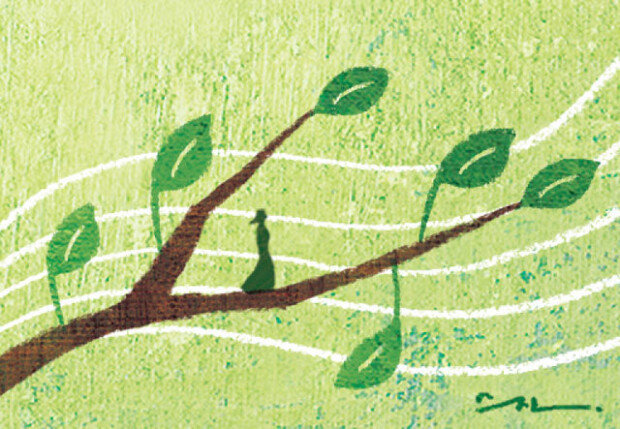Love song
Love song
Posted March. 26, 2021 07:46,
Updated March. 26, 2021 07:46

A wife ardently misses her husband. As spring is in full swing, deep green mulberry trees on Jin’s territory get ever leafier but a northern land in the Yan Kingdom where her husband lives may have just started being covered with flimsy sprouts. As she worries that the battering cold and barrenness may only make things hard on her husband, she cannot shake him off of her mind. The belief in each other reading the other's mind is a cure-all for the couple, whose feelings are never cured by whatever is a warm-hearted word, to feel as if they were closer to each other.
The wife tries to console herself by thinking that at the very moment of her husband yearning to return home, she truly misses him from the bottom of her heart. Being reminded of their strong bond, she tries to overcome the absence of her husband. However, the scent of spring breezes through a silk curtain as if it reminded her of what it is like to be alone. She resists where she has been by making exaggerated but adorably cute excuses that her husband is a stranger. Another woman demonstrates the same level of pureness when she passes a bowl of water to an unfamiliar man in Kim Dong-hwan's poetry titled “The Sin of Laughing.” “It is none of my business even if the sun does not rise at Pyongyang castle. I just smiled by mistake.”
Unlike Li Bai's poetic egos filled with valor and masculinity enjoying drinking and living just like a hermit, he tries to put himself into the shoes of a woman in this piece of poetry. As some poems are written on behalf of another speaker, they represent a variety of people including women, farmers and soldiers. Critics see this genre as a voice to understand the weak whereas it is criticized as an expression of male chauvinism in that poetic objects are considered to embody patience and sacrifice.
Headline News
- Joint investigation headquarters asks Yoon to appear at the investigation office
- KDIC colonel: Cable ties and hoods to control NEC staff were prepared
- Results of real estate development diverged by accessibility to Gangnam
- New budget proposal reflecting Trump’s demand rejected
- Son Heung-min scores winning corner kick







